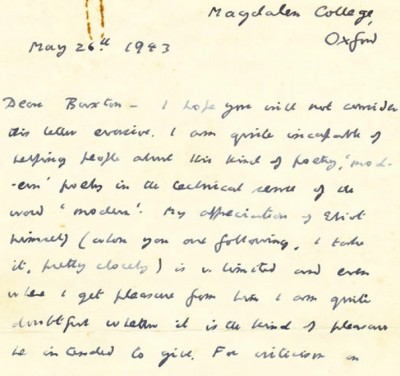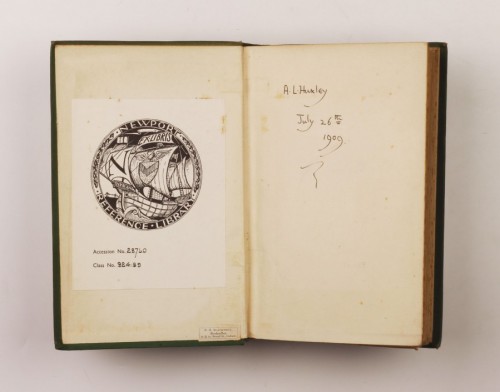Anniversaries by Aldous Huxley
Do you remember where you were on November 22nd 1963, the terrible day that President John F. Kennedy was assassinated? That same day the world lost two of the most influential writers of the 20th century, C.S. Lewis and Aldous Huxley.
It has been half a century since their deaths and today C.S. Lewis will be honoured with a memorial stone in poet's corner, Westminster Abbey, the first Belfast born writer to be commemorated thus. His plaque will stand alongside such august poets as William Blake, John Keats, Oscar Wilde and T.S. Eliot.
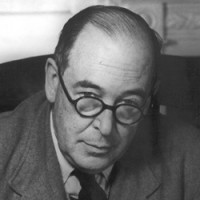
Lewis who is best known for writing the chronicles of Narnia, science fiction stories and religious works, also whiled away many an hour reading and discussing poetry.
It is not without some irony that his memorial should sit alongside that of T.S. Eliot. Lewis was no great champion of Eliot’s poetry, “my appreciation of Eliot … is v. limited” he wrote in a letter dated May 26th, 1943. “and even when I get pleasure from him I am quite doubtful whether it is the type of pleasure he intends to give.”
Lewis declared himself “quite incapable of helping people about this kind of poetry, 'modern' poetry in the technical sense of the word modern."
By contrast as an exponent of the Romantic poets, whose writing was generally out of fashion during much of the mid twentieth century, he would be glad to keep company with the likes of Wordsworth and Keats. In numerous essays and lectures Lewis argued the superiority of Romanticism over other forms of poetry.
In lengthy letters to Nevill Coghill, a literary scholar and regular member of the Inklings, Lewis expounded his views,
“The universal form of human experience, being mature, not corrupted, is the contrast between experience and something not experienced, which is nevertheless the object of desire…In Romanticism the contrast is expressed in the form of longing (Sehnsuht). Romanticism I regard as being genuinely universal.”
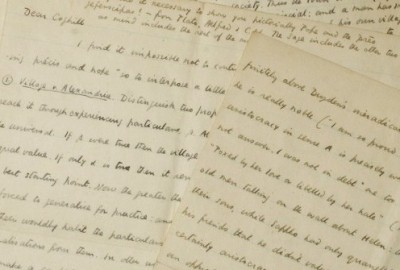
He goes on to compare the phraseology of poets, “’Beauty draws us by a single hair’ (Pope) and “A thing of beauty is a joy forever’(Keats) while both are delightful, which is the more quaint, and which the soberer? Which has the more straining after effect?”
Fifty years after his death it is good to see that Lewis’s memory is no longer totally overshadowed by the Kennedy assassination and his place in poets corner is undoubtedly deserved.
“The highest point so far attained by Anglo-Saxon sophistication” is how Huxley’s first novel Crome Yellow was described by F. Scott Fitzgerald. Yet there is to be no memorial for Huxley at Westminster.
In 1916 Oxford undergraduate, Aldous Huxley a final year student and already editor of Oxford Poetry, had his first book published. The book of poems entitled The Burning Wheel was printed in an edition of just 250 copies and was to be the first of many writings.
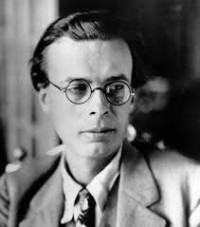
Huxley's most abiding work is probably the dystopian novel Brave New World “...[a] brilliantly plausible fantasy he has constructed from his scientific gleanings. It is a Utopia which is never dull, of which the horror is always credible...” (Connolly). As a teenager Huxley had been greatly influenced by the works of Samuel Butler, citing Butler’s novel “Erewhon” as the inspiration for Brave New World and for his 15th birthday Huxley received this copy of Butler’s Essays on Life, Art and Science”
After a lengthy career and having published dozens of volumes, ranging from novels and poetry to essays and plays Aldous Huxley contracted cancer in 1960 and on his deathbed asked his wife to administer him with LSD, she complied and at 5.20pm (one hour and ten minutes before JFK was shot) he passed away.
We have handled many of Huxley’s books over the years. Currently in stock we have a bibliography of his works which once belonged to Dennis Wheatley – a devotee and scholar of Huxley’s work.
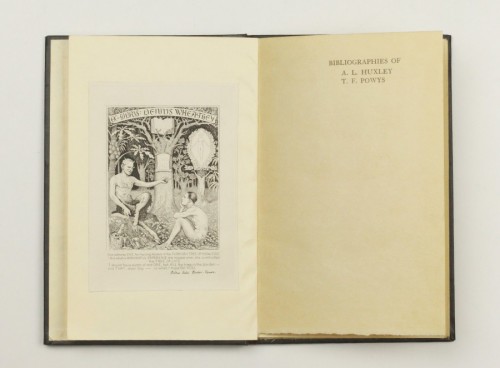
Many of our customers are aficionados of his books, actively seeking first editions of all his writings, so why is the world outside of antiquarian bookshops largely unaware of the anniversary of the loss of this great writer?
I enquired among friends which of Huxley’s books they have read. A few reported to have studied Brave New World at school, often in order to compare it with Orwell’s Nineteen Eighty-Four. One or two had read Crome Yellow and Point Counter Point, but the majority professed to have read nothing, expecting to find his work staid or slow moving.
I concur that Huxley’s prose clearly differs from the modern literary form. It is slower moving with some lengthy passages of description, more challenging vocabulary and less immediate gratification. I find his novels interesting, thought provoking and thoroughly readable. “Words can be like X-rays if you use them properly -- they’ll go through anything. You read and you’re pierced.” (Huxley - Brave New World)
Read his work, both prose and verse, and bear in mind the words of C.S. Lewis, “The esse of poetry is that it produces wisdom.”
Find further information on C.S. Lewis and Aldous Huxley, together with a selection of their work.
Recent Posts
- The Evolution of Crime
- Tour The Bookshop On Your Screen
- The Genesis of Mr. Toad: A Short Publication History of The Wind In The Willows
- Frank Hurley's 'South'
- The "Other" Florence Harrison
- Picturing Enid Blyton
- Advent Calendar of Illustration 2020
- Depicting Jeeves and Wooster
- Evelyn Waugh Reviews Nancy Mitford
- The Envelope Booklets of T.N. Foulis
- "To Die Like English Gentlemen"
- Kay Nielsen's Fantasy World
- A Brief Look at Woodcut Illustration
- The Wealth Of Nations by Adam Smith
- What Big Stories You Have: Brothers Grimm
- Shackleton's Antarctic Career
- Inspiring Errol Le Cain's Fantasy Artwork
- Charlie & The Great Glass Elevator
- Firsts London - An Audio Tour Of Our Booth
- Jessie M. King's Poetic Art, Books & Jewellery
Blog Archive
- January 2024 (1)
- January 2023 (1)
- August 2022 (1)
- January 2022 (1)
- February 2021 (1)
- January 2021 (1)
- December 2020 (1)
- August 2020 (1)
- July 2020 (2)
- March 2020 (3)
- February 2020 (2)
- October 2019 (2)
- July 2019 (2)
- May 2019 (1)
- April 2019 (1)
- March 2019 (2)
- February 2019 (1)
- December 2018 (1)
- November 2018 (1)
- October 2018 (2)
